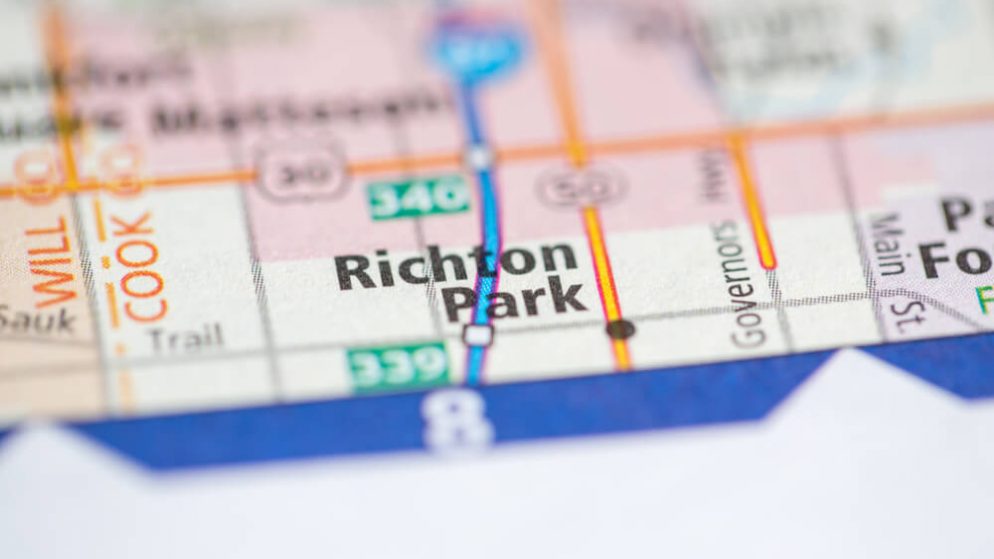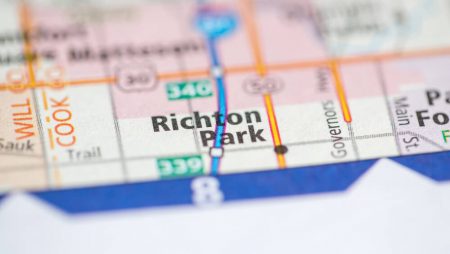

A team of investors recently came out to announce that they have everything it takes to finance the construction of a new casino and racetrack in Illinois. Eyeing the far south suburbs, the group of financiers argued that the development would be a great benefit to the horse racing industry that was struggling to stay relevant. They however had one request to make of the state’s lawmakers; lift the starting gate.
The potential partners that have recently come together to form the Greenway Entertainment Group LLC envision a top of the range “first-class racino destination” that will be comprised of 1,200 slot machines. The proposed location for the new gambling hub is just off Interstate 57 in Richton Park, and will require an estimated $350 million to make it a reality. If this proposal is to go through and bring gains to the economy of Illinois, one step must precede all others; state law is amended to allow Hawthorne Race Course to veto any new tracks.
Speaking on the proposed development, the former president of the shuttered Arlington International Racecourse, Roy Arnold, said that delaying the racetrack was blocking other viable projects that would have otherwise kicked off in the area. Arnold, who is a party to the Greenway bid lamented that their interest was in making the industry sustainable but time is not on their side.
The negotiation for the veto provision was made as part of the gambling industry expansion drive of 2019 that encompassed the entire state. The law gave authority to existing tracks to have additional casino games onto their portfolio and made it legal for a new harness racetrack to open in the south suburbs. At the helm of the expansion was Gov. J.B. Pritzker whose signature was instrumental in pushing for the approval of the infrastructure improvement plan. During his tenure, sports betting was introduced in the state and six new casinos added.
Close to four years have gone by since that time and the sports betting industry has flourished a great deal. Existing casino projects are rolling forward although a major one like Hawthorne still hasn’t installed the slots that were considered to be a lifeline for the industry. Furthermore, plans for a new south suburban track appear to have been crashed out of the gate.
A few weeks ago in Springfield, a bill was introduced by state Sen. Patrick Joyce which has been designed to eliminate Hawthorne’s veto power by summer. Hopefully, this is the much-needed push that will open the door for the Greenway group to apply to break ground on a track in the Essex Democrat’s district. The former head of the Illinois Thoroughbred Horsemen’s Association, Mike Campbell, reported that they were ready to forge ahead since it seemed Hawthorne were not. The position of the association is that the wait had been too long and they were not willing to continue the wait. This sentiment is shared by the Greenway group together with suburban developers Drew Daniels & Tom Walsh, as well as an unspecified number of investors.
According to Campbell, all the effort they are putting in right now is in anticipation that the industry will be able to rise above the challenges it currently faces. The site on which the racetrack has been proposed is an 80-acre piece of land next to Sauk Trail which was previously a landfill that is currently in the process of being converted into a commercial project. This type of development is great for state economic progress and is therefore welcome in every community. Considering the numerous employment opportunities and tax revenue that result from the expansion of the industry, it is a development that has guaranteed ROI.
The president of Hawthorne, Tim Carey, has revealed that the family’s track has been operational since 201 after the Maywood and Balmoral parks were closed. This development has played a vital role since Arlington Park was closed by Churchill Downs Inc. and acquired by the Chicago Bears. On the veto protection that took place during a March 22 state Senate Executive Committee meeting on the new bill, Carey said that all they were interested in was protection. As a group that values unity, eliminating the veto like it had been proposed, would seriously hurt the brand.
Carey communicated with the Illinois Gaming Board in the second week of March to explain the cause and need for delay of the Hawthorne’s $400 million racino renovation that had been announced in 2020. He tied the mishap to supply chain issues specifically around the time that Covid-19 hit, leading to a volatile finance market. The Senate panel also heard that Carey and his team wanted to do well at the racetrack and that is why they did not arrange for 1,200 slots in the grandstand.
He further addressed the issue of loyalty and obligation stating that a project of such magnitude could not be handled lightly considering the long-term effects it will have on the horse racing sector in Illinois. In regard to a new harness track, Carey chose to partner with developer Rick Heidner to draft a proposal that would break ground at the location where Tinley Park Mental Health Center stands. The plan was however, thrown out towards the end of 2019 after Heidner appeared as the subject of a federal search warrant related to corruption. Following this revelation, Pritzker’s office refused to sell off the land for that particular project.
Conclusion
Carey believes that the Hawthorne Race Course will be up and operational by the end of 2024 and shortly after the suburban one will go up. According to Campbell, such a delay would be fatal for an industry that has seen a migration of racino investors to states that appear to have better purse prospects. It is a great thing that Hawthorne continues to run the races, but there must be visible progress.






